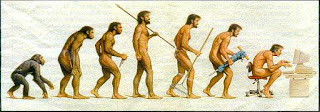On Darwin's Lost World
Martin Brasier was a prolific paleontologist. And from what little I know of him, he must have been a pretty cool guy. I recently read his book "Darwin's Lost World" and it was definitely one of the better decisions of my life.
On Darwin
Thankfully, even the most plebeian of science curricula finds it worthwhile to describe Charles Darwin's scientific accomplishments. To me, all through childhood, Darwin represented my superiority to the apes. When someone said Darwin, I would get a mental picture of an ape gradually turning human. That's an overly simplistic picture, but then again, there is so much to learn about everything that one doesn't quite know where to start.
 |
| Source |
The rock record is the only thing that can give us a picture of the ancient Earth. Most other branches of science can tell you what the Earth is like, and why it is the way it is. But it was Geology that first told us what the Earth was like, and bits of why it was that way. When Darwin was trying to make Evolution popular, he was faced with a problem. His basic premise needed support from fossils and no one would (quite reasonably) believe him about evolution unless he could show evidence for it. It's relevant to remember that he was up against the endorsers of Creationism - roughly, the idea that Man is a special creation of God.
What a pity then for this brilliant scientist to find that while he could trace some patterns across species that showed evolution (fossils got gradually simpler in reversed time), he came to a dead end near the Cambrian.
The Cambrian
Geologists divide geological time into various eras and periods (and some more terms). Geological time is the time the lapse of which one sees in the rocks: from the way they were deposited, from the way they were changed, from the way they were even destroyed. Watched the Jurassic Park/World? The Jurassic represents a span of time, and everything associated with that span of time too.
Another span of time similar to the Jurassic period (ca 201-145 million years ago) is the Cambrian (ca 541-485 million years ago) period. It's evident that Cambrian rocks would be much older than the Jurassic rocks, and would normally be found below the Jurassic ones. So far so good.
Why might you have heard of the Cambrian? Because of the Cambrian Explosion. Scientists had been finding different kinds of fossils from different rocks representing various time periods. However, it would all begin at the base of the Cambrian. Imagine playing evolution in reverse in one's head, and then imagine coming to an abrupt full stop right at the base of the Cambrian every single time. Why was there such a silence before the Cambrian? Was there nobody around before that?
Darwin's problem
So here (back in the 1860s) is our revolutionary evolutionary researcher trying to tell the world that we are not unique creations of Divine Providence, rather, we are just one branch of the Tree of Life, where everything begins with a single root. Except for the part that they couldn't trace the Tree beyond (older than) the Cambrian. One might guess that they had simply reached the root, but this:
 |
| Source |
frankly, does not look like the root, does it? That is Fallotaspis, a Cambrian fossil. Note that the concept of a cell had been put forward by Robert Hooke as far back as 1665, so it was obvious even in the late 19th century that Fallotaspis, a multicellular organism could not possibly be the end (or the start, if you like). Apparently, the Cambrian shows a sudden bloom in life and diversity (an "explosion") with fossils as complex as this emerging out of nothingness. How is that even possible? If Darwin had to replace Creationism, he had to show an ancestor to this being too.
Where was the root? Was there a root? Was there a world before the Cambrian that Darwin could see, but seemed lost to the rest of the world?



Does it make sense to think that cambrian period was simply a period when a great deal of fossilization happened because of some environmental factors?
ReplyDeleteAs in, all the diversity in fauna didn't just "appear" out of nothingness, they were already developed, but weren't recorded as fossils due to some reason.
Yes, certainly! I'm going to follow up with more posts about this.
DeleteThats great! Especially since you are someone who has a relevant background in this field.
DeleteThis comment has been removed by the author.
ReplyDeleteIt was a fun read, but the fact that it ended suddenly feels odd. Just out of curiosity, is the topic too large to be covered in a single blog post?
ReplyDeleteThere's going to be a follow up post really soon. :)
DeleteI could have compressed the topic in a single post, but that runs the risk of making it too tiring a read. The idea is that science is not strenuous or arcane, and most reasoning (even between diverse fields) remains essentially simple.